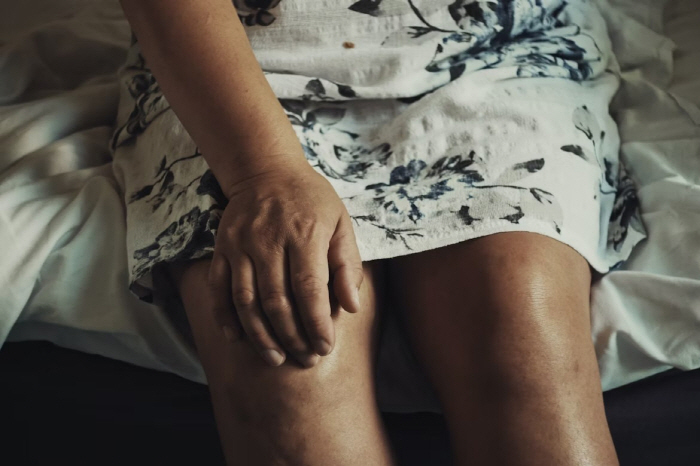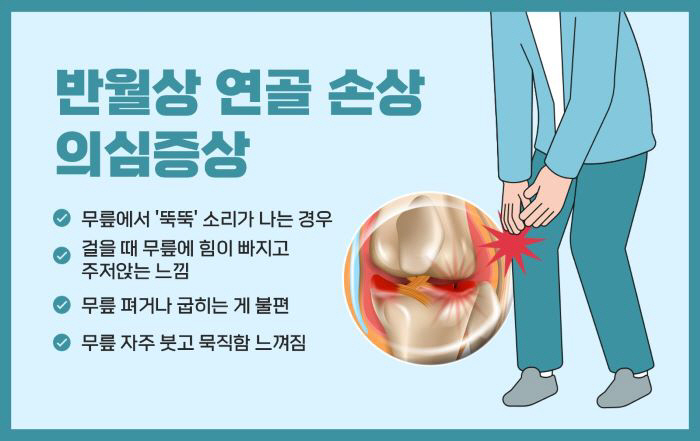People in their 50s and 60s, be careful of cartilage damage in the meniscus of the knee...Degenerative arthritis when left unattended at Himchan Hospital
|
Among them, arthritis, a degenerative disease in the knee, is more common in middle-aged women. One of the important structures of the knee, meniscus cartilage, is important because it does not recover naturally once damaged or torn, and if the damage has progressed, it should be treated quickly.
The meniscus cartilage protects the bone-wrapped cartilage between the thigh and calf bones, effectively dispersing weight and absorbing shock. In addition, it performs a key function of increasing the stability of knee joints and protecting joint cartilage. If meniscus cartilage, which has excellent shock absorption capacity, is torn because it cannot overcome excessive shock, it can cause inflammation and progress to degenerative arthritis.
`Although the proportion of middle-aged patients is high as meniscus cartilage rupture is often caused by degenerative changes, the number of young people is increasing due to injuries during intense sports activities"There is no need to worry about muscle pain or bruising related to sports damage because the pain usually disappears after three to four days, but if knee pain continues three to four days after trauma, there is a possibility that damage to joints such as meniscus cartilage may have been caused, so a specialist consultation is needed."
◇Easy rupture due to meniscus cartilage aging and external impact
Many patients in their 50s or older visit the hospital due to meniscus cartilage rupture, because the moisture content decreases as the cartilage matrix component changes with age, and the fiber also regresses, resulting in a decrease in elasticity. As a result, it is vulnerable to external shocks and is prone to tearing.
According to the Health Insurance Review and Assessment Service, out of a total of 67,197 patients who visited the hospital due to meniscus cartilage rupture (torn of existing meniscus cartilage) in 2023, 32,639 people in their 50s and 60s accounted for about 48.6%. When young, the cartilage itself has a lot of moisture and is flexible, so it effectively absorbs shock, but when you get older, the moisture in the cartilage decreases with denaturation, making it easier for the cartilage to become hard. As a result, various ruptures easily occur even with a small impact.
Recently, the number of patients with meniscus cartilage rupture is also increasing among young people. It is common among people who enjoy exercise with frequent changes of direction, such as soccer, basketball, and tennis, and a sudden change of direction causes the knee to warp and tear the cartilage plate. Obesity can also increase the weight load on the knee, increasing the probability of tearing the cartilage plate. In addition, there is a high risk of occurrence even if you kneel a lot or squat down for a long time due to your job. This is because bending the knee carries up to three to five times the weight, putting a great burden on the knee cartilage.
In particular, it is more common in women with menopause after their 50s, and it should be noted that meniscus cartilage damage in the middle-aged is a pre-stage of degenerative arthritis.
In fact, as of 2023, the number of female patients in their 50s was 9,543 and the number of female patients in their 60s was 17,759, which is 2.4 times and 2.7 times higher than those in their 40s (3962). When the meniscus cartilage protecting the articular cartilage is damaged, the pressure on the articular cartilage increases, accelerating the damage to the articular cartilage. You should be careful of climbing or exercising too much because you are overconfident in your health, and adjust the intensity of your exercise in consideration of your age or knee health.
◇Customized treatment for accurate diagnosis and condition is important
Because meniscus cartilage does not have neurons, it is not easily recognized when it is a little torn. However, if the rupture progresses to some extent, you will feel uncomfortable in bending and stretching your knees with pain.
Sometimes the knee makes a 'tuk' sound, and it may be normal if it makes a sound without pain, but if it is accompanied by pain and if you feel a different weight than usual when bending and unfolding your knee, you should suspect a cartilage rupture. In addition, if you feel weak and slumped in your knees when walking, if you feel uncomfortable bending and stretching your knees, and if your knees are swollen frequently and heavy, you should get an examination.
When the meniscus cartilage is torn, it cannot act as a cushion, and the articular cartilage in the bone also begins to wear out. As cartilage wears off, bones directly hit each other, and the articular cartilage surrounding the bone is peeled off, bending legs and worsening arthritis. Non-surgical treatment is recommended when the meniscus cartilage plate is partially slightly torn or relatively less important area is torn. Cartilage injections, collagen injections, and PRP injections are mainly used, and they are carried out as pro-drug injections that strengthen the muscles around the knee. Taking analgesic anti-inflammatory drugs along with these injection treatments can help relieve symptoms and pain. However, if the damage is already severe and it is difficult to expect relief only with non-surgical methods, surgical treatment should be considered.
"Sometimes patients insist on cartilage injection treatment without surgery, and after understanding the exact knee condition, a specialist and appropriate treatment should be determined," said Ryu Seung-yeol, head of the medical clinic"For meniscus cartilage health, it is good to exercise frequently to strengthen the femoral quadriceps, a very important muscle surrounding the knee, because the condition of the femoral quadriceps is an important factor in determining the progression speed of degenerative arthritis."
|
This article was translated by Naver AI translator.





